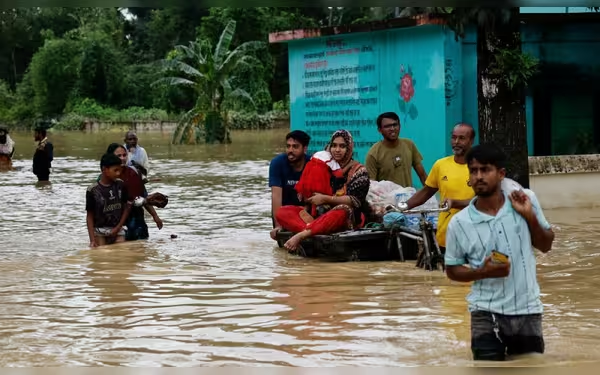Saturday, November 16, 2024 05:45 PM
Devastating Floods in Bangladesh Claim Lives and Displace Thousands
- Five dead and over 100,000 stranded in Bangladesh floods.
- Sherpur district faces severe agricultural damage risks.
- UN launches $134 million appeal for flood relief efforts.
 Image Credits: brecorder
Image Credits: brecorderFloods in Bangladesh have left five dead and over 100,000 stranded, prompting urgent rescue efforts and a UN humanitarian appeal.
In recent days, northern Bangladesh has been grappling with devastating floods that have claimed the lives of at least five individuals and left over 100,000 people stranded. These floods have been triggered by heavy rainfall and torrents from upstream, leading to a dire situation for many residents. The Sherpur district, one of the hardest-hit areas, has seen water levels in major rivers rise dramatically, submerging homes and farmland, and displacing thousands of families.
Local authorities are deeply concerned about the potential damage to agriculture, particularly to rice fields, which are vital for the country’s food supply. With many homes and roads now under several feet of water, entire villages have been cut off, leaving residents in urgent need of rescue. One local resident, Abu Taher, expressed his shock, stating, “I have never seen such flooding in my life.”
In response to the crisis, army personnel have joined the rescue efforts, utilizing boats and helicopters to deliver emergency supplies and evacuate those trapped by the rising waters. However, the situation remains critical as bridges have collapsed and roads have been submerged, complicating the efforts of local authorities to reach affected areas. Sherpur district administrator Torofdar Mahmudur Rahman emphasized, “Our priority is to evacuate people to safe shelters and provide them with essential supplies.”
Tragically, another decomposed body, believed to have floated from India, has been discovered, highlighting the severe impact of the floods. Bangladesh, a low-lying nation with a population of 170 million, has faced multiple flooding events this year, which underscores its vulnerability to climate change. A 2015 analysis by the World Bank Institute estimated that around 3.5 million people in Bangladesh are at risk of annual river flooding, a risk that scientists warn is increasing due to global climate change.
As the floodwaters continue to rise, concerns are mounting regarding the long-term effects on agriculture, especially rice crops. If the waters do not recede soon, the economic impact on farmers could be devastating. Adding to the anxiety, the weather office has forecasted more rain in the coming days, raising fears of further inundation.
The floods that occurred in August in eastern Bangladesh resulted in over 70 fatalities and caused damage estimated at $1.20 billion, according to a study by the Centre for Policy Dialogue, a prominent think-tank. In light of the ongoing crisis, the United Nations and its partners have launched a $134 million humanitarian appeal to provide urgent relief and support to communities affected by the floods and cyclones in Bangladesh.
The situation in northern Bangladesh serves as a stark reminder of the increasing frequency and intensity of natural disasters linked to climate change. As communities come together to support one another during this challenging time, it is crucial for the global community to recognize the urgent need for sustainable solutions to mitigate the impacts of climate change and protect vulnerable populations.













